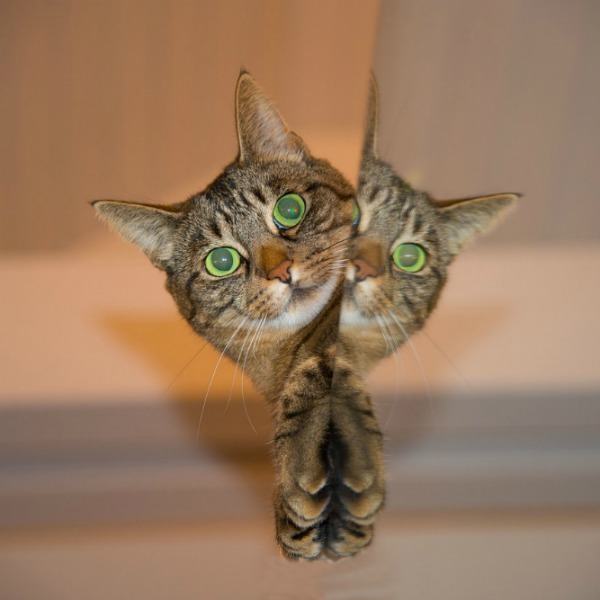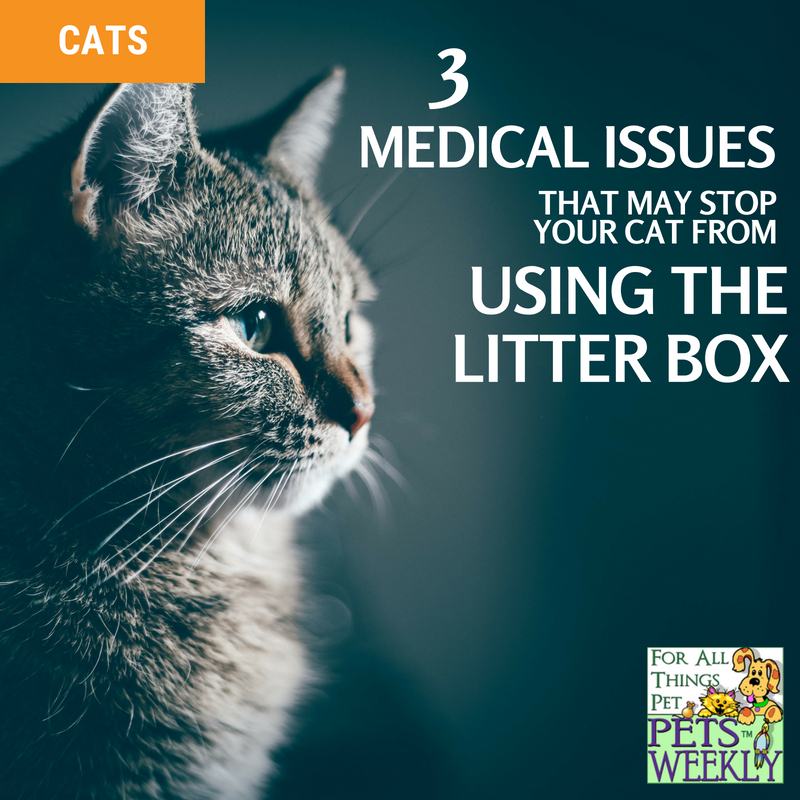There are many reasons why your cat may stop using the litter box, but the top 3 reasons are medically-related.
First of all, it’s important to understand that cats are complex beings and reasons for their actions may not be obvious to those who are not well-versed in all things cat. They process life experiences much differently than humans, and respond in ways that often make no sense to us.
Here’s an example I experienced recently – we brought in a foster cat. My elder cat was feeling stressed by this new arrival even though their access was limited. The mere idea of other animals in the home stressed her out. She began to act out her displeasure by not using the litter box. Once we found a home for the foster, she stopped her behavior. We were lucky – we didn’t give her time to get in the habit. But oftentimes, that’s exactly what happens and it can take a long time to resolve a behavioral issue like that.
Little things can set them off too – even something as simple as a change in location or not cleaning a litter box, can cause them to stop using it.
In order to fix the problem, you need to know the cause of the problem. Occasionally, the reason has something with to do with the medical fitness of your cat or some outside stressor. Cats are masters of hiding pain and it can be difficult to decide if a cat is avoiding a litter box due to a physical ailment, stress, or fear.
Physical ailments can often result in your feline from using the box because they begin to associate pain from urination with using the box.

1. Feline Lower Urinary Tract Disorder (FLUTD); formerly known as Feline Urologic Syndrome (FUS) or Feline Idiopathic Cystitis (FIC)
FLUTD is again a very common issue with cats. The term “Cystitis” is most commonly used to describe “bladder inflammation”.
While it sounds tame, it’s not. Urinary disease is a very serious issue for cats due to a very delicate urinary tract. It may be that their urethra is too small (which can cause blockages).
A poor quality diet can contribute to “stones” (which are incredibly dangerous and often fatal for cats).
Or your cat may have recurring conditions as a result of genetics, anatomical anomalies (for example, we learned my spayed female cat actually has both male/female parts, making her/him a hermaphrodite in the animal kingdom), and other physical problems.
Several things may be contribute or cause FLUTD, including:
- Viruses (such as calicivirus)
- Infection (either bacterial, parasitic, or fungal)
- Stress can create (or make worse)
- Diet
- Anatomical disorders
- Disease
Whatever the cause, it’s important to have this diagnosed fast and treated just as quickly. Whenever your cat begins displaying unusual symptoms, it’s so very important to get them to a veterinarian. Only they can truly determine the reasons for not using a litterbox.
2. Urinary Tract Infections
Urinary Tract Infections (UTI) are common in cats of all ages and merely refers to a bacterial infection in the bladder.
The technical term for a painful bladder (often occurring with UTI) is “feline interstitial cystitis”, (which is technical jargon that means the veterinarian can’t determine the exact cause).
Some veterinarians believe it is caused by nervous disorders, stress, diet and nutrition, anatomical abnormalities, water quality, or disease. It could be that your cat is just naturally prone to them, just as some humans are naturally prone to urinary infections.
Whatever the reason, they can be frequent or infrequent. They often last from 3 days to a week and can be treated with antibiotics. However, you’ll want to make sure your vet rules out any other issues prior to deciding it’s just a common occurrence.
3. Crystals or Urethral Blockage
While male cats are most well-known for blockages (due to a small urethra), any cat can develop crystals or blockages.There are several types of “crystals” which are tiny stones that block your cat’s urethra, including struvite stones and protein-based stones.
These stones make urination incredibly painful (just as if a human were to get a bladder stone). Anyone who has been through bladder stones knows how miserable you are (even with the amazing pain medications available). Since cats are so difficult to treat for pain, it can be even more excruciating for them.
- Refusal to use litterbox
- “Spraying” or inappropriate elimination in bathtub, sink, bed, etc.
- Blood in urine
- Frequent licking of genital area
- “Yowling” when they attempt to urinate
- Lying on their side
- Fever
- Frequent (but unproductive) trips to the litterbox
- Growling or refusal to be picked up
- Refusal to eat or drink
- Dehydration
Any one of more of these symptoms means you must get your cat into a veterinarian. A blockage is a very serious issue and can be fatal to your cat in a matter of hours after symptoms appear.
In each of these cases, your vet will have to do some detective work to rule out common issues before arriving at a diagnosis. This means you’ll need to be prepared to offer consent for several tests (which can be pricey). They are all very important though – I really can’t emphasize that enough – and your veterinarian will need to do them if they suspect problems.
- Bloodwork (to check for infection and other issues)
- Urinalysis (which will identify if there is blood in the urine)
- Full physical examination
- Possible X-rays if kidney stones are suspected
- Cystocopy if cysts, stones or polyps are suspected
- Ultrasound for general information about the cat's bladder
I can't say it enough - bladder problems are cause for veterinarian treatment and urethra blockages are reason for emergency treatment. Since it's hard to tell the difference, be sure you get your cat in for an exam immediately.
Bonus: Behavioral and/or Environmental Factors
There are thousands of reasons a cat may stop using their box. Here are a few more possible reasons (and don't forget to check out our special guide, The Definitive Guide to Stop Cats from Spraying.
- There may be behavioral factors at play (e.g., Have you added a new animal or other person to your home?)
- Is your cat getting bullied by a more aggressive pet (e.g., Is your dog raiding your litterbox?)
- There could be simple environmental factors at play (e.g., Did you clean your box? Have you moved your cat's litterbox? Do you have enough litter boxes for your cats?)
It's very important to remember that your cat is not "acting out" in an attempt to punish you. This is why you should never "punish" them for negative behavior. Cats are very much like children and use the tools they have available to communicate a problem. Occasionally, these tools include behavior that is annoying and difficult to tolerate - like spraying or refusing to their box.
It's up to you, as the owner, to make an effort to understand why a cat does what he does. Interpreting behavior is all part of the mystique that goes into caring for cats and having such a beautiful creature share your life. But if you remember that cats don't act without a reason, just as we don't act without a reason, it will give you greater insight into not only your pets, but your human relationships.
Consider symptoms holistically and treat accordingly. If your veterinarian has ruled out any physical problems, consider environmental and behavioral issues.
Read 10 Possible Reasons Your Cat Is Behaving Badly for additional help on identifying and managing behavioral and environmental issues.

